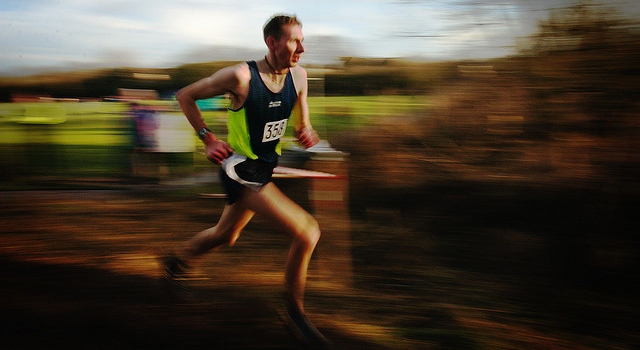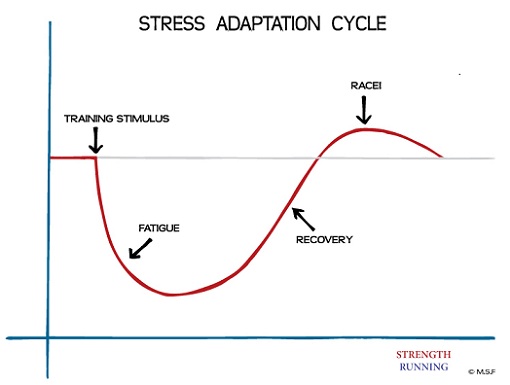Did you know that some people think running isn’t a good form of exercise – and even that it’s downright dangerous? Are they nuts?!

Recently I got an email from Bhavesh who asked me to comment on Mark Sisson’s post A Case Against Cardio (from a former mileage king). I heartily recommend you read the whole article even if you’re a committed distance runner.
The author runs Mark’s Daily Apple, a health site focusing on a “Primal” lifestyle. The Primal diet is very similar to Paleo and the lifestyle piece also includes aspects of overall wellness and exercise.
My email reply had several points that I’m now going to expand on. But before I start, a short disclaimer:
I love Mark’s Daily Apple. I read it regularly, my wife regularly goes 100% Primal, I own his book The Primal Blueprint, and I agree with about 95% of Mark’s content.
However, I disagree wholeheartedly with his premise that endurance training is counter-productive to good health. Today we’re going to explore some of the science and I’ll offer some specific rebuttals against what Mark has to say. No matter your preference – Primal vs. Endurance – let’s be civil.
Either way we’re all healthier than the average person.
Aerobic vs. Anaerobic and the Intensity Debate
Mark’s argument is almost entirely based on “high intensity aerobic exercise” which he defines as 80-85% of your maximum heart rate. This roughly correlates with just under your tempo pace – or lactate threshold.
Mark claims that runners are doing high intensity running sessions all the time and they:
- Increase cortisol (a stress hormone)
- Decreases efficient fat metabolism (so you burn less fat while exercising)
- Increases systemic inflammation
- Boring (can’t argue with this one – different strokes for different folks!)
- Increases oxidative damage (free radical production)
First, let’s recognize that no runner in their right mind would try to do the majority of their running around their tempo pace. If they do, that’s incredibly poor planning or terrible coaching.
For me, that effort would be about 5:40 per mile. In reality, the majority of my running is over a minute per mile slower. And that’s true for most runners out there.
Sounds like “moving frequently at a slow pace” to me.
That pretty much discredits the entire “runners always run at a high intensity level and this is bad” argument since no runner actually does this for all of their training.
But let’s look at Mark’s specific concerns about running.
Running Increases Cortisol
Mark claims that high intensity aerobic training increases cortisol – a stress hormone that can weaken the immune system (and have other adverse health effects if present in large quantities).
This is true – hard running does increase cortisol. But since sane runners don’t even approach their tempo pace for the majority of their runs, this really is a non-issue.
Yes, a very long run or tough workout will increase cortisol levels. But that’s not a bad thing. Cortisol helps the adaptation process; you temporarily decrease your immune system, inflict a small amount of muscle damage, and stress your body. But then, by God, your body adapts and you get stronger!
That’s what training is all about folks. Without a period of over-stress you won’t super-compensate.

Cortisol becomes a problem when it’s released and stays at relatively high levels for long periods of time. As Mark has talked about before, the “flight or fight” stress response from encountering a lion and having to run away is intense but short-lived. The more insidious stress response is the constant, low-level cortisol response from having to work a job you hate for long hours or fighting constantly with your spouse.
From a personal perspective, I was curious about my cortisol level in February of 2010 so I had it checked during a routine physical. My cortisol was perfectly normal and I was running over 60 miles per week at the time – with tough workouts.
As long as you’re managing the recovery aspect of you’re training, hard training shouldn’t increase your cortisol levels to any level you need to be worried about.
Running Decreases Efficient Fat Metabolism
Absolutely not! First, have you ever seen a fast runner? They’re bodies are made thin by thousands of miles of aerobic running that whittle their body fat percentage to the single digits.
Instead of looking at the evidence in plain sight, let’s consider the physiology behind the distance runner’s best friend: the long run.
A favorite among half-marathoners and marathoners, the long run increases endurance (the ability to run fast for long periods of time) by:
- Increasing muscular endurance – allowing your legs to handle the impact of hours of running
- Recruiting more fast twitch muscle fibers to share the workload the more fatigued you get (so you actually work on your speed by running long – essentially doing the same thing Mark recommends but through a different mechanism)
- Training the body to burn a higher percentage of fat instead of glycogen!
One of the main reasons that Mark is against running – it decreases fat metabolism – isn’t supported at all. In fact, this study shows that aerobic training like running burns more visceral and liver fat than resistance training.
And this study shows that running is better than strength sessions for weight loss. This isn’t to show that you have to choose between the two – both have an important part in any healthy exercise program – but aerobic running is actually better for general weight loss.
Running Increases Systemic Inflammation
One of Mark’s major criticisms of running is that it increases “systemic inflammation.” He goes on to say that his…
carbohydrate-fueled high-intensity aerobic lifestyle was promoting a dangerous level of continuous systemic inflammation, was severely suppressing other parts of my immune system and the increased oxidative damage was generally tearing apart my precious muscle and joint tissue.
He has a flair for the dramatic, doesn’t he? My first two gut reactions are:
- Mark’s coach had no idea what she was doing.
- Mark was severely over-trained.
I just don’t buy that distance running – even high-level marathon training – causes the body to produce a high-level immune response that leads to systemic inflammation.
In fact, Mark posted an article earlier this year that summarized the findings of numerous studies that showed aerobic exercise reduced inflammation (even “high intensity” aerobic exercise). He goes on to say that some inflammation is good because it produces adaptations that are necessary to get “increased stamina…and…improved workload capacity.” Sounds like inflammation is good because it leads to endurance!
His point is that marathoners are “hyper-competitive” and are likely to overdo it. He admits that you can get systemic inflammation from almost any type of exercise if you overdo it.
So in my view, the bottom line is this: over-training is the culprit of systemic inflammation, not simply aerobic exercise or distance running.
In other words: too many hard miles, too many CrossFit AMRAP workouts, or too many sets in the gym are the real enemy here – not running.
Running Increases Oxidative Damage

Oxidative stress is the result of the production of free radicals, which happens during hard training. Strenuous exercise obviously results in more oxidative stress than you experience by going for a leisurely walk.
My issue is that this entire field of study is extremely new and unclear. I just can’t take Mark’s bold claims without an enormous grain of salt. Consider:
- Oxidative stress is not clearly linked to aging or cell damage (see here)
- Strenuous running increases free radical production which signals our bodies to produce more antioxidants! (see here and here).
- Exercise actually protects you from the oxidative damage of pollution (see here).
There’s also a growing body of research that shows supplementing with high doses of antioxidants (like Vitamin C and E) actually inhibit the beneficial adaptations that exercise signals your body to make. So fighting off all oxidative damage isn’t necessarily a good thing
Like I mentioned before, muscle damage, inflammation, and even oxidative stress are all good things provided you recover. So let’s simplify:
Running too much, too hard = way too much oxidative stress = bad
Distance Running: The Fountain of Youth
I’m a firm believer that running is the best form of exercise you can do provided you do it correctly. The impact will help maintain your bone mass while the aerobic nature of running will keep your heart healthy. Coupled with 1-2 weekly, full body strength workouts and your exercise program is just about perfect.
But let’s look at what the science says of the numerous benefits of running:
- Feeling like you might get sick? 30 – 45 minutes of moderate exercise stimulates the immune system!
- In a study of over 100,000 runners, those who ran over 35 miles per week (compared with those who ran less than 9 miles) decreased midlife weight gain in the stomach and hip area.
- Kettlebells can provide an aerobic workout but treadmill running burns more oxygen and calories.
- Among 1,000 adults, wintertime colds were reduced by 43% in those who got aerobic exercise more than five days per week vs. less than one day.
- Running boosts serotonin levels in the brain, acting as an anti-depressant
- Running is the most time efficient exercise for your heart
- High intensity exercise (like intervals or racing) can prevent brain lesions
- Regular exercise can prevent migraines
- Running later in life can keep you as fit at 50 as an unfit 20 year old
- Running as a kid helps you cross streets better!
- The further and faster you run, the less risk you have of glaucoma, cataracts, and macular degeneration.
Running is One Part of Health: Balance and Variety
I’m not saying that running should be your only form of exercise. Of course you know that I love core exercises, strength work, and other forms of cross training like triathlon training.
In fact, all types of strength training are good for your running but heavy lifting is best for your finishing kick at the end of a race (see here).
I’ll also be clear that certain types of running – like racing a marathon – are incredibly stressful. One study compared the level of stress post-marathon to that of military personnel being interrogated or rape victims being treated acutely. But it also shows
“post-race testees did better on tests of ‘implicit memory,’ which is how you store information that you don’t need to access consciously, like how to ride a bike.” It seems that marathon stress “causes you to tap into the older, reptilian part of your brain, where instinct and intuition dominate.”
Sounds pretty Primal to me.
Ultimately, my advice to all runners is to embrace variety and a well-rounded training plan. Not every runner should be doing mega mileage and if you are, keep in mind you’re doing it to optimize performance, not general health.
But the next time a CrossFit, Primal, or Paleo enthusiast tries to tell you that running is bad for you, just smile. You know better.